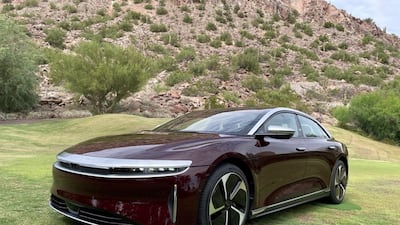Saudi Arabia's electric vehicle market is growing as more motorists adopt sustainable modes of transport, driving the kingdom to a top-50 spot for the first time in the latest industry index released by AlixPartners.
The Arab world's biggest economy moved up to 49th place in the New York-based consultancy's Automotive Electrification Index for the fourth quarter of 2021, showing the rising awareness of consumers when it comes to the benefits of going electric.
Saudi Arabia's rise “reflects this growing drive towards a sustainable future”, said Alessandro Missaglia, managing director of AlixPartners Middle East. “We will continue to see further progress in the coming years, underpinned by the government’s dedicated focus on the sector.”
The adoption of EVs is rising worldwide as governments turn to more sustainable solutions to help reduce carbon emissions and contribute to the fight against climate change.
Saudi Arabia set a goal of achieving net-zero carbon emissions by 2060 through a “circular carbon economy approach” compatible with the kingdom’s development and diversification plans, Crown Prince Mohammed bin Salman said at the Saudi Green Initiative forum last October.
The AlixPartners index showed that Saudi Arabia rose five places on a year-on-year basis and one spot from the third quarter.
The UAE, whose first EV manufacturing plant in Dubai opened last month, ranked 38th for the second straight quarter. The facility from M Glory will be one of the largest in the Middle East and aims to make 55,000 EVs a year.
“Both Saudi Arabia and the UAE are taking action to start manufacture of electric vehicles in-country and to tap into the significant opportunity the electric vehicle market represents,” Mr Missaglia said.
E-range — a global measure of progress in vehicle electrification based on the integral electric range of new EVs sold — surged 36 per cent on a quarterly basis globally, marking a new all-time high and a trend that will “only accelerate”, AlixPartners said.

China remains the leader in new EVs based on e-range, accounting for 58 per cent of the global total. The US is a distant second with about 11 per cent, although its market is growing steadily.
Almost 12 per cent of the global fleet of cars were electric, or roughly one in every eight, in the fourth quarter, up from 9 per cent in the third quarter, the index showed.
Tesla, the industry pioneer led by the world's richest person Elon Musk, continues to top the charts, commanding a market share of almost 23 per cent, AlixPartners said.
China's BYD and Germany's Volkswagen come in second and third place, respectively, reflecting how Chinese manufacturers are catching up with their western counterparts.
The International Energy Agency said in its 2021 report that EVs enjoyed 9 per cent market share of the global car industry as sales more than doubled to 6.6 million last year.
An estimated 20 million plug-in vehicles will be on the world's roads this June, BloombergNEF estimates showed earlier this month, a remarkable growth compared to just one million in 2016. In the second half of 2022, almost a million EVs a month will be added to the global fleet, it said.
The AlixPartners survey has been carried out on a quarterly basis since 2017 and covers 73 countries.











